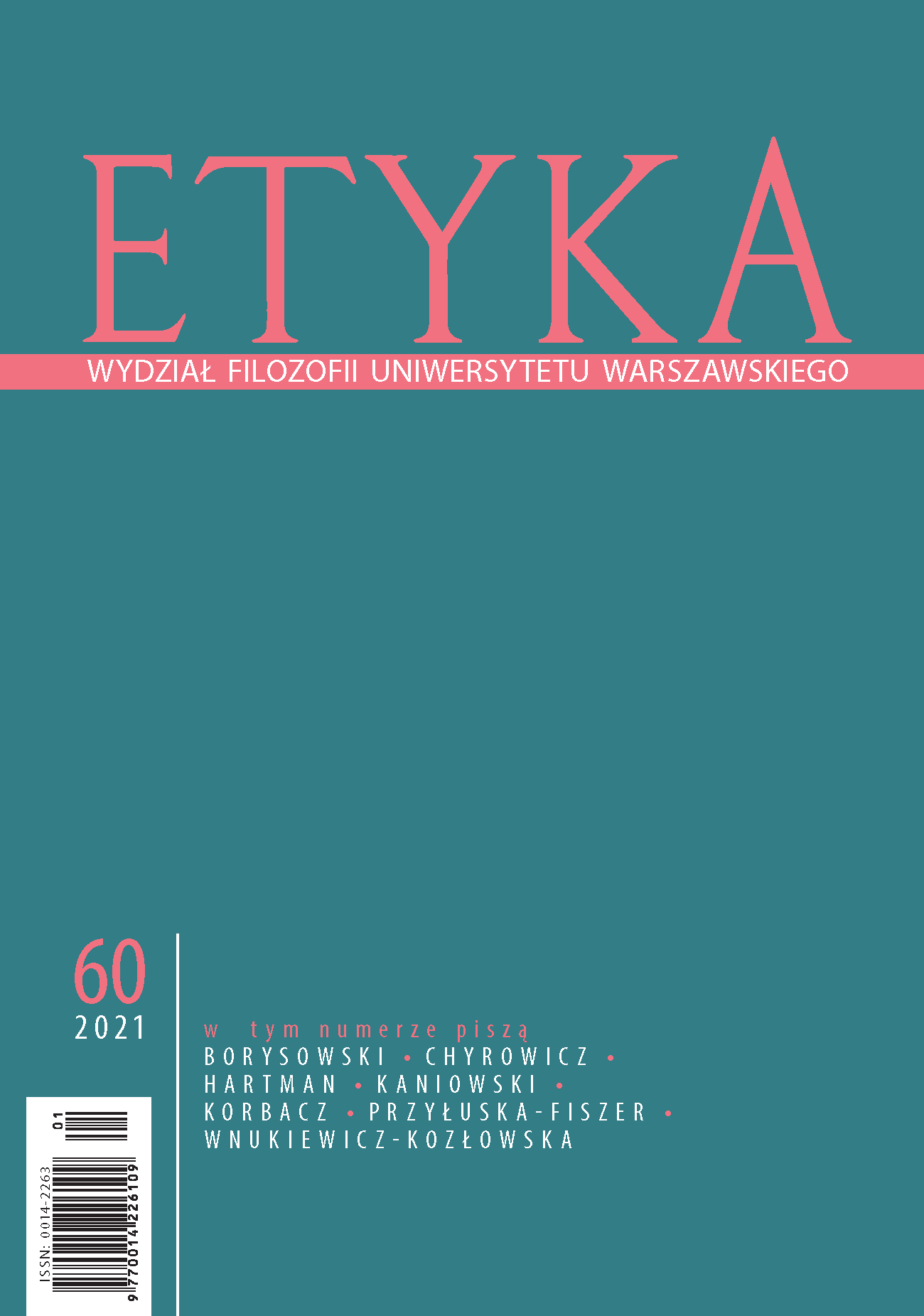Model solutions for the organization and functioning of Polish National (Central) Bioethics Committee
Abstract
Many countries have national/central bioethics committees whose role is to monitor and give opinions on current bioethical issues arising from advances in medical knowledge and the biological sciences. The procedure for setting up these committees, as well as their modes of operation and influence on practice, vary from country to country. UNESCO has developed a number of guidelines on the organisation and functioning of such bodies. In Poland, there is a need to specify the principles of operation of a national/central bioethics committee. The aim of this text is to review the legal possibilities of establishing and functioning of national/central bioethics committees together with a presentation of their role and a reflection on the shape, place, meaning and function of such a body in Polish conditions.
References
Ayala, F.J. 2015. “Cloning humans? Biological, ethical, and social considerations.” Proceedings of the National Academy of Sciences of the United States of America, 112(29): 8879–86. https://doi.org/10.1073/pnas.1501798112.
Baker, E.F., Geiderman, J.M., Kraus, C.K., Goett, R. 2020. “The role of hospital ethics committees in emergency medicine practice”. Journal of the American College of Emergency Physicians Open, 1(4): 403–407. https://doi.org/10.1002/emp2.12136.
Bioethics Committees at Work. Procedures and policies. 2005. UNESCO.
Bolcato, M., Russo, M., Feola, A., della Pietra, B., Tettamanti, C., Bonsignore, A., Ciliberti, R., Rodriguez, D., Aprile, A. 2020. “The Motion of the Italian National Bioethics Committee on Aggressive Treatment towards Children with Limited Life Expectancy”. Healthcare, 448 (8): 2–9.
Caplan, A.L., Parent, B., Shen, M., Plunkett, C. 2015. “No time to waste – the ethical challenges created by CRISPR.” EMBO Rep., 16(11): 1421–1426. https://doi.org/10.15252/embr.201541337.
Childress, J.F. 1998. “The National Bioethics Advisory Commission: Bridging the Gaps in Human Subjects Research Protection.” Journal of Health Care Law and Policy, 105: 105–122.
Cubillos-Ruiz, A., Guo, T., Sokolovska, A., Miller, P.F., Collins, J.J., Lu, T.K., Lora, J.M. 2021. “Engineering living therapeutics with synthetic biology.” Nature Reviews Drug Discovery, 20(12): 941–960. https://doi.org/10.1038/s41573-021-00285-3.
Dodds, S.M., Thomson, C., “Bioethics And Democracy: Competing Roles Of National Bioethics.” Bioethics, 20(6): 326–338.
Doudna, J.A., Charpentier, E. 2014. “Genome editing. The new frontier of genome engineering with CRISPR-Cas9.” Science, 346(6213): 1258096. https://doi.org/10.1126/science.1258096; https://news.berkeley.edu/2015/12/01/crispr-inventor-calls-for-pause-in-editing-heritable-genes/ (dostęp: 15.01.2022).
Educating Bioethics Committees. 2007. UNESCO.
Ehni, H.J., Wiesing, U. 2019. “Illegitimate authorship and flawed procedures: Fundamental, formal criticisms of the Declaration of Helsinki.” Bioethics, 33(3): 319–325. https://doi.org/10.1111/bioe.12503.
Eiseman, E. 2003. The National Bioethics Advisory Commission. Contributing to Public Policy, RAND, https://www.rand.org/pubs/monograph_reports/MR1546.html (dostęp: 20.12.2021).
Elgharib, M. 2016. “Committees: National Bioethics Committees.” W: Encyclopedia of Global Bioethics, H. ten Have (red.). Dordrecht: Springer International Publishing.
Enfield, K.B., Truwit, J.D. 2008. “The purpose, composition, and function of an institutional review board: balancing priorities.” Respiratory Care, 53(10): 1330–6.
Gefenas, E., Lukaseviciene, V. 2017. “International Capacity-Building Initiatives for National Bioethics Committees.” Hastings Cent Rep, 47 Suppl 1(Suppl Suppl 1): S10–S13. https://doi.org/10.1002/hast.711.
Guan, L., Han, Y., Yang, C., Lu, S., Du, J., Li, H., Lin, J. 2021. “CRISPR-Cas9-Mediated Gene Therapy in Neurological Disorders.” Molecular Neurobiology [in press], https://doi.org/10.1007/s12035-021-02638-w.
Hummel, P., Adam, T., Reis, A., Littler, K. 2021. “Taking stock of the availability and functions of National Ethics Committees worldwide.” BMC Med Ethics, 22(1): 56. https://doi.org/10.1186/s12910-021-00614-6.
Huriet, C. 2009. Article 19: Ethics Committees.” W: The UNESCO Universal Declaration on Bioethics and Human Rights. Background, Principles, and Application, H. ten Have, M.S. Jean (red.), 265–270, Paris, http://www.int-chair-bioethics.org/wp-content/uploads/2015/08/The-UNESCO-Universal-Declaration-on-Bioethics-and-Human-Rights-Background-Principles-and-Application.pdf (dostęp:15.12.2021).
Kaebnick, G.E. , Gusmano, M.K., Murray, T.H. 2014. “The ethics of synthetic biology: next steps and prior questions.” Hastings Cent Rep., 44(6 Spec no.): S4–S26. https://doi.org/10.1002/hast.392.
Kierkegard, L.W. 2010. “The Danish Council of Ethics.” W: National Bioethics Committees in Action, UNESCO, 65–71.
Klinger, K., Żółciak, T., Osiecki, G. 2022. Kulisy dymisji Rady Medycznej. Jakie były prawdziwe powody, https://serwisy.gazetaprawna.pl/zdrowie/artykuly/8334469,dymisja-rady-medycznej-powody-kulisy-nie-chcemy-autoryzowac-kolejnych-zgonow.html (dostęp: 16.01.2022).
Komitet Bioetyki PAN. b.r. Regulamin Komitetu Bioetyki przy Prezydium PAN, https://bioetyka.pan.pl/index.php?option=com_content&view=article&id=184&Itemid=49&lang=pl (dostęp:15.01. 2022).
Köhler, J., Reis, A.A., Saxena, A. 2021. “A survey of national ethics and bioethics committees.” Bull World Health Organ., 99(2): 138–147. https://doi.org/10.2471/BLT.19.243907.
Lock, S. 1990. “Towards a national bioethics committee Wanted: a new strategic body to deal with broad issues.” British Medical Journal, vol. 300: 1149–1150.
Ministerstwo Edukacji i Nauki. b.r. UNESCO – Organizacja Narodów Zjednoczonych do spraw Oświaty, Nauki i Kultury, https://www.gov.pl/web/edukacja-i-nauka/unesco-organizacja-narodow-zjednoczonych-do-spraw-oswiaty-nauki-i-kultury (dostęp 15.12.2021).
Montgomery, J. 2017. “The Virtues of National Ethics Committees.” Goals and Practices of Public Bioethics: Reflections on National Bioethics Commissions, special report, Hastings Center Report, 47, no. 3: S24–S27. https://doi.org/10.1002/hast.715.
Nuffield Council on Bioethics. b. r. https://www.nuffieldbioethics.org (dostęp: 11.04.2022).
Organisations. 2006. https://ro.uow.edu.au/artspapers/106 (dostęp: 10.01. 2022).
PAN. b.r. Komitet Bioetyki PAN, https://bioetyka.pan.pl/index.php?option=com_content&view=article&id=189&Itemid=220&lang=pl (dostęp: 15.01.2022).
Pawlikowski, J. 2020. „Etyczny wymiar decyzji priorytetyzacyjnych i alokacyjnych dotyczących stosowania zaawansowanych technologii medycznych w kontekście pandemii COVID-19”. Med. Prakt., 4.
Raport Zespołu do spraw Konwencji bioetycznej. 2008. (dostęp: 07.09.2017).
Reardon, S. 2022. „First pig-to-human heart transplant: what can scientists learn?”. Nature, 601: 305–306. https://doi.org/10.1038/d41586-022-00111-9.
Robert, R., Kentish-Barnes, N., Boyer, A., Laurent, A., Azoulay, E., Reignier, J. 2020. “Ethical dilemmas due to the Covid-19 pandemic.” Ann Intensive Care, 10(1): 84. https://doi.org/10.1186/s13613-020-00702-7.
Rozporządzenie Ministra Zdrowia z dnia 11 maja 1999 r. w sprawie szczegółowych zasad powoływania i finansowania oraz trybu działania komisji bioetycznych, Dz.U. z 1999 r. Nr 47, poz. 480.
Rządowe Centrum Legislacji. b.r. Projekt ustawy o badaniach klinicznych produktów leczniczych stosowanych u ludzi, https://legislacja.rcl.gov.pl/projekt/12346302/katalog/12784810#12784810 (dostęp: 5.01.2022).
Downloads
Published
Issue
Section
License
Works published in ETYKA are available under the Creative Commons Attribution No Derivatives 4.0 International Licence (CC BY-ND), which entails acknowledgement of authorship without derivative works. Under this licence, Authors keep their copyrights and agree that their works can be used again legally for any purpose, including commercial ones, except for the creation of derivative works, without the need to obtain previous consent of the Author or publisher. The articles can be downloaded, printed, copied and disseminated; under the condition that the authorship is indicated accordingly, together with the place of original publication. The Authors preserve their copyrights to the above-mentioned works without any limitation whatsoever.



